
If you’re one of the many individuals with health and well-being at the top of priority list for this year’s resolutions, you are in good company. And for those who are already eating a vegan, or a primarily plant-based diet, you are on the right path. You see, hundreds of studies indicate that a plant-based diet is indeed the healthiest on the planet while also being the most environmentally sustainable. I would know, being a Registered Dietitian, writer, and editor who has spent the majority of my twenty-eight career pouring over the latest scientific research.
The benefits of a plant-based diet may not be news to you, but the Internet and mainstream media is rife with misperceptions and inaccurate information surrounding vegetarian and vegan diets. While there seems to be no doubt that plant-based diets can promote optimal health, it takes thoughtful planning to ensure that you are receiving all the health rewards a vegan diet has to offer. It is possible to crowd out essential nutrients in a vegan diet if you’re allowing too much room dedicated for junk foods, such as snacks, sweets, baked goods, and sweetened beverages.
In planning appropriate plant-based meals, a few key nutrients and micronutrients merit consideration, particularly for vegans and near-vegans.
- Calcium: Aim for eating three servings of calcium-rich foods each day and you’ll be achieving your recommended daily intake. Good sources of calcium include green leafy vegetables, almonds, broccoli, and calcium-fortified foods, such as milk alternatives, tofu, and orange juice.
- Vitamin D: Soak up 10 minutes of sunshine each day, consume vitamin D fortified foods, such as soy milk and orange juice, and consider taking a vitamin D supplement to help fill in the nutrient gaps.
- Vitamin B12: It’s recommended that all vegans or near vegans take a daily vitamin B12 supplement as deficiency of this nutrient can result in anemia and nerve damage. Also aim to eat vitamin B12 fortified products, such as cereal and soy milk, as well as nutritional yeast which contain vitamin B12.
- Omega-3 Fatty Acids: Since the plethora of health benefits associated with this long-chain fatty acid is mounting, you may want to consider taking a vegan EPA + DHA supplement derived from microalgae, as well as get daily sources of the plant omega 3 fatty acids (ALA) found in walnuts, chia, hemp, and flax.
- Protein: It’s a common misconception that it’s difficult to get enough high-quality protein if you don’t eat animal foods; but, when you focus on choosing an abundance of whole, minimally processed plant foods, including legumes, soy foods, whole grains, nuts, seeds, and even vegetables, you should have no problem getting enough protein.
- Iron and Zinc: Like protein, if you’re eating a varied plant-based diet, it should be no problem getting adequate amounts of iron and zinc in your diet.
To jumpstart your healthy eating regime for the New Year and beyond, try this plant-powered recipe or pick up a copy of my book, The Plant-Powered Diet for more delicious recipe ideas and nutrition tips.
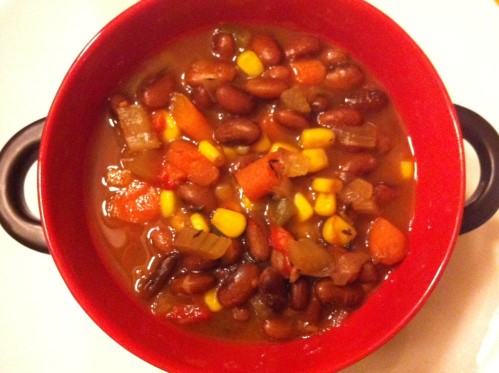
Cajun Rattlesnake Beans with Corn
1 ½ cups dried rattlesnake beans
4 cups water
1 tsp vegetable broth mix
1 cup tomato or vegetable juice, low-sodium
1 bell pepper, red or green
1 medium tomato, chopped
1 onion, medium, chopped
1 cup chopped celery
1 cup chopped carrots
1 cup frozen corn
2-3 tsp Cajun seasoning (adjust per desired taste)
1 bay leaf
2 cloves garlic
1 tsp dried thyme
Makes 8 servings (about 1 cup each)
- Soak beans overnight in water. Drain the next day.
- Place soaked, drained beans in a large pot. Add all remaining ingredients.
- Stir well, cover pot and bring to a simmer. Cook for about 1 hour and 45 minutes, stirring occasionally, until beans are tender. Adjust seasonings as desired.
- May cook in a slow cooker at medium for 4 hours.
Sharon Palmer is a registered dietitian, food & nutrition writer, editor, and author of The Plant-Powered Diet. She is passionate about foods that are grown locally and sustainably. Check out Sharon’s blog, The Plant-Powered Dietitian Blog here, or take a look at her website.

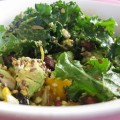
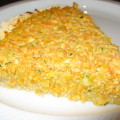
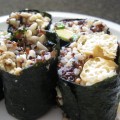

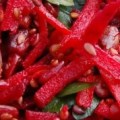
1 Comment
Chia (324 comments)
January 17, 2013 at 11:11 amRattlesnake beans sound so risky… looks like red kidney beans from this photo.